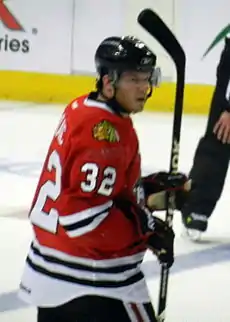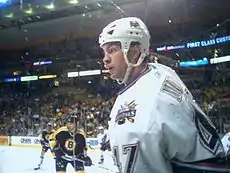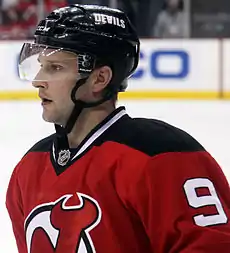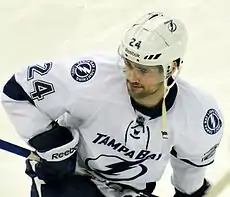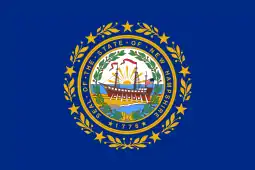New Hampshire Wildcats men's ice hockey
The New Hampshire Wildcats men's ice hockey team is a National Collegiate Athletic Association (NCAA) Division I college ice hockey program that represents the University of New Hampshire. The Wildcats are a member of Hockey East. They play at the Whittemore Center Arena in Durham, New Hampshire.[2]
| New Hampshire Wildcats | |
|---|---|
 | |
| University | University of New Hampshire |
| Conference | Hockey East |
| Head coach | Michael Souza 3rd season, 27–30–13 (.486) |
| Captain | Anthony Wyse |
| Arena | Whittemore Center Capacity: 6,501 |
| Location | Durham, New Hampshire |
| Colors | Blue, Gray, and White[1] |
| NCAA Tournament Runner-up | |
| 1999, 2003 | |
| NCAA Tournament Frozen Four | |
| 1977, 1979, 1982, 1998, 1999, 2002, 2003 | |
| NCAA Tournament appearances | |
| 1977, 1979, 1982, 1983, 1992, 1994, 1995, 1997, 1998, 1999, 2000, 2002, 2003, 2004, 2005, 2006, 2007, 2008, 2009, 2010, 2011, 2013 | |
| Conference Tournament championships | |
| 1979, 2002, 2003 | |
| Conference regular season championships | |
| 1992, 1997, 1999, 2002, 2003, 2007, 2008, 2010 | |
| Current uniform | |
 | |
History
Early years
The first New Hampshire ice hockey team played in January 1925, winning its first two games in a contest held in Lewiston, Maine.[3] A year later, now under the stewardship of Ernest Christensen, UNH played its first home game at the UNH ice rink, an outdoor facility that was completely dependent on cold weather for its surface. The Wildcats would play a small number of games for their first 15 seasons, fluctuating between an undefeated season in 1927 and a winless campaign in 1932. Christensen retired in 1938 and the team eventually came under the tutelage of Anthony Dougal but his tenure was suspended in 1943 due to the outbreak of World War II. The team finally returned to the ice in January 1947 with Dougal remaining for one year before handing the program over to Joseph Petroski. Horace "Pepper" Martin took over after four rather poor seasons and New Hampshire's fortunes began to change. By the mid-1950s the Wildcats started to play more and win more games than they ever had before and in 1955 an artificial ice rink was constructed on campus to help the team play more than a handful of home games.[4]
ECAC
In 1961 New Hampshire was one of 28 schools that were founding members of ECAC Hockey. Martin turned the team over to A. Barr Snively and plans were underway to replace the Harry C. Batchelder Rink with an indoor ice rink. In the offseason of 1964, two events happened that hampered the ice hockey program. First, in April, head coach Snively suffered a heart attack and tragically died.[5] With the school searching for a replacement the ECAC announced that it was dividing itself into two separate tiers. 'Major' program would continue on with ECAC Hockey but 'minor' schools would be forced to join the newly-formed ECAC 2. Because their indoor facility had not yet been completed New Hampshire was forced out of the top tier. Rube Bjorkman was eventually named as head coach and he led the team for four years. During his tenure, the indoor arena was completed and christened as the Snively Arena after his late predecessor and a year later the program was readmitted into the top echelon of college hockey.
It was Bjorkman's successor, Charlie Holt, who put New Hampshire on the college hockey map. In Holt's first season UNH played its first postseason game, earning Holt his first of three Spencer Penrose Awards. In his first five seasons, the Wildcats finished with a winning record and then won the ECAC regular season championship in his sixth year. The Wildcats made their first NCAA appearance in 1977 and captured their first Conference championship two years later, but no matter how good Holt's teams were national success continued to elude him. under Holt the Wildcats went 0–6 in the frozen four and 2–8 in the tournament overall. While the wins started to come few and far between in the mid-1980s Holt continued to helm the program as it left ECAC Hockey to form Hockey East with six other northeastern schools.
Bob Kullen
Holt stepped down in 1986 and was replaced by long-time assistant Bob Kullen. In his first year the team saw marginal improvement but that summer Kullen was diagnosed with a rare form of heart disease that necessitated a transplant and his missing an entire season to recuperate.[6] Dave O'Connor served as the interim head coach for 1987–88 allowing Kullen to return in the fall of '88. In two years New Hampshire saw its wins total improve to 12 and then 17 but by 1990 Kullen started rejecting his new heart and was forced to resign. Another UNH assistant, Dick Umile, was named as his replacement and unfortunately, Kullen died in November 1990 at the age of 41. Hockey East swiftly renamed its coach of the year award in his honor while the team continued the upward swing he began, allowing Umile to be the first recipient of the rechristened award.
Umile years
In Umile second season New Hampshire made the NCAA tournament for the first time in almost a decade and retroactively finished first in the conference after Maine was forced to forfeit 13 games. The team continued to play well for several seasons but after a disappointing season in 1996, the team won its first Hockey East Championship and set a new program record with 28 wins. The following year the Wildcats made the Frozen Four for the first time in 16 years and then reached even higher in 1999. in the penultimate year of the millennium the Wildcats won 30 games for the first time, establishing a still-record of 31 victories (as of 2019), winning their second conference title (first outright) and were led by sophomore goaltender Ty Conklin and senior center Jason Krog, the latter won the NCAA scoring title by 16 points and captured the Hobey Baker Award (UNH's only recipient as of 2019). Despite losing in the Hockey East tournament finale The team received the #2 overall seed and a bye into the second round. The Wildcats defeated two Michigan schools to reach their first National Championship game where they would ultimately fall in overtime to conference rival Maine.
UNH would continue to be a power in Hockey East, winning back to back conference championships in 2002 and 2003 and reached their second NCAA title game in '03 where they lost to Minnesota, 5-1. UNH would make the NCAA tournament every year from 2002 through 2011 but the team could not make it out of the Regionals after 2003. Starting in 2012 the program began a slow decline, ending up dead-last in the conference in 2017–18. After that season Umile decided to retire, leaving the school as the all-time leader in just about every coaching category and recording the third most wins all-time for one school at the Division I level.
Umile's final act for the program was to name his successor, allowing 1999 alumnus Michael Souza to become the 14th head coach in program history.
Season-by-season results[7]
Head coaches
As of the completion of 2019–20 season[7]
| Tenure | Coach | Years | Record | Pct. |
|---|---|---|---|---|
| 1922–1923 | Hank Swasey | 1 | 2–2–0 | .500 |
| 1925–1936, 1937–1938 | Ernest Christensen | 12 | 55–54–8 | .504 |
| 1936–1937 | Carl Lundholm | 1 | 3–5–0 | .375 |
| 1938–1939 | George Thurston | 1 | 5–4–0 | .556 |
| 1939–1943, 1946–1947 | Anthony Dougal | 5 | 15–28–0 | .349 |
| 1947–1951 | Joseph Petroski | 4 | 9–20–0 | .310 |
| 1951–1962 | Horace "Pepper" Martin | 11 | 76–76–3 | .500 |
| 1962–1964 | A. Barr Snively | 2 | 23–22–0 | .511 |
| 1964–1968 | Rube Bjorkman | 4 | 57–40–0 | .588 |
| 1968–1986 | Charlie Holt | 18 | 347–232–18 | .596 |
| 1986–1987, 1988–1990 | Bob Kullen | 4 | 37–66–8 | .369 |
| 1987–1988 | Dave O'Connor | 1 | 7–20–3 | .283 |
| 1990–2018 | Dick Umile | 28 | 598–375–114 | .603 |
| 2018–Present | Michael Souza | 2 | 27–30–13 | .479 |
| Totals | 14 coaches | 94 seasons | 1261–970–167 | .561 |
Statistical Leaders[8]
Career points leaders
| Player | Years | GP | G | A | Pts | PIM |
|---|---|---|---|---|---|---|
| Ralph Cox | 1975–1979 | 128 | 127 | 116 | 243 | |
| Jason Krog | 1995–1999 | 151 | 94 | 144 | 238 | |
| Darren Haydar | 1998–2002 | 158 | 102 | 117 | 219 | |
| Jamie Hislop | 1972–1976 | 119 | 77 | 132 | 209 | |
| Mark Mowers | 1994–1998 | 144 | 85 | 112 | 197 | |
| Louis Frigon | 1967–1971 | 89 | 98 | 95 | 193 | |
| Bob Gould | 1975–1979 | 135 | 91 | 101 | 192 | |
| Cliff Cox | 1972–1976 | 108 | 87 | 88 | 175 | |
| Jon Fontas | 1974–1978 | 107 | 72 | 102 | 174 | |
| Frank Roy | 1975–1979 | 131 | 71 | 103 | 174 | |
| Joe Flanagan | 1988–1992 | 140 | 85 | 89 | 174 |
Career goaltending leaders
GP = Games played; Min = Minutes played; W = Wins; L = Losses; T = Ties; GA = Goals against; SO = Shutouts; SV% = Save percentage; GAA = Goals against average
minimum 30 games played
| Player | Years | GP | Min | W | L | T | GA | SO | SV% | GAA |
|---|---|---|---|---|---|---|---|---|---|---|
| Ty Conklin | 1998–2001 | 93 | 5580 | 57 | 23 | 12 | 202 | 1 | .915 | 2.18 |
| Kevin Regan | 2004–2008 | 112 | 6599 | 70 | 29 | 10 | 250 | 9 | .928 | 2.27 |
| Casey DeSmith | 2011–2014 | 97 | 5637 | 48 | 36 | 8 | 218 | 9 | .923 | 2.32 |
| Jeff Pietrasiak | 2002–2006 | 55 | 2904 | 27 | 13 | 6 | 119 | 2 | .917 | 2.46 |
| Mike Ayers | 2000–2004 | 102 | 5755 | 58 | 25 | 12 | 239 | 12 | .914 | 2.49 |
Statistics current through the start of the 2019–20 season.
Current roster
As of September 17, 2020.[9]
| No. | S/P/C | Player | Class | Pos | Height | Weight | DoB | Hometown | Previous team | NHL rights |
|---|---|---|---|---|---|---|---|---|---|---|
| 1 | Jeremy Forman | Freshman | G | 5' 10" (1.78 m) | 160 lb (73 kg) | 1999-09-22 | Northbrook, Illinois | Corpus Christi (NAHL) | — | |
| 2 | Drew Hickey | Junior | D | 5' 11" (1.8 m) | 185 lb (84 kg) | 1997-10-28 | New Canaan, Connecticut | Connecticut (NCDC) | — | |
| 3 | Ryan Verrier | Junior | D | 6' 0" (1.83 m) | 175 lb (79 kg) | 1998-11-19 | Reading, Massachusetts | Green Bay (USHL) | — | |
| 5 | Will MacKinnon | Junior | D | 5' 11" (1.8 m) | 200 lb (91 kg) | 2000-04-13 | Plymouth, Michigan | Des Moines (USHL) | — | |
| 6 | Lucas Herrmann | Sophomore | F | 6' 2" (1.88 m) | 187 lb (85 kg) | 2000-08-01 | Lancaster, New York | Madison (USHL) | — | |
| 8 | Nikolai Jenson | Freshman | D | 5' 11" (1.8 m) | 187 lb (85 kg) | 2000-07-28 | Cold Spring, Minnesota | Youngstown (USHL) | — | |
| 9 | Angus Crookshank | Junior | F | 5' 11" (1.8 m) | 180 lb (82 kg) | 1999-10-02 | North Vancouver, British Columbia | Langley (BCHL) | OTT, 126th overall 2018 | |
| 10 | Kalle Eriksson | Sophomore | D | 5' 10" (1.78 m) | 175 lb (79 kg) | 1999-09-15 | Leksand, Sweden | Madison (USHL) | — | |
| 11 | Jackson Pierson | Junior | F | 5' 9" (1.75 m) | 160 lb (73 kg) | 1999-09-10 | Zionsville, Indiana | Culver (Midget AAA) | — | |
| 12 | Eric Esposito | Junior | F | 5' 11" (1.8 m) | 180 lb (82 kg) | 1998-08-24 | West Haven, Connecticut | Youngstown (USHL) | — | |
| 13 | Nick Cafarelli | Freshman | F | 5' 10" (1.78 m) | 185 lb (84 kg) | 2001-12-31 | Middleton, Massachusetts | Wenatchee (BCHL) | — | |
| 15 | Chase Stevenson | Sophomore | F | 5' 11" (1.8 m) | 175 lb (79 kg) | 1999-01-13 | West Kelowna, British Columbia | Trail (BCHL) | — | |
| 16 | Filip Engarås | Junior | F | 6' 0" (1.83 m) | 190 lb (86 kg) | 1999-05-16 | Stockholm, Sweden | Skellefteå (J20 SuperElit) | EDM, 169th overall 2020 | |
| 17 | Carsen Richels | Freshman | F | 6' 3" (1.91 m) | 230 lb (104 kg) | 2001-10-03 | Ham Lake, Minnesota | Blaine (USHS–MN) | — | |
| 18 | Kohei Sato | Senior | F | 6' 1" (1.85 m) | 185 lb (84 kg) | 1996-09-26 | Nishitōkyō, Japan | Northeast (NAHL) | — | |
| 19 | Eric MacAdams (A) | Senior | F | 5' 11" (1.8 m) | 190 lb (86 kg) | 1997-04-29 | Salem, Massachusetts | Dubuque (USHL) | — | |
| 20 | Patrick Grasso (A) | Senior | F | 5' 7" (1.7 m) | 170 lb (77 kg) | 1996-05-29 | Ankeny, Iowa | Des Moines (USHL) | — | |
| 21 | Cam Gendron | Freshman | D | 6' 3" (1.91 m) | 180 lb (82 kg) | 1999-02-05 | Hampstead, New Hampshire | New Jersey (NAHL) | — | |
| 22 | Joe Hankinson | Sophomore | F | 6' 0" (1.83 m) | 190 lb (86 kg) | 1999-06-15 | Hopkins, Minnesota | Cedar Rapids (USHL) | — | |
| 23 | Charlie Kelleher (C) | Senior | F | 5' 8" (1.73 m) | 160 lb (73 kg) | 1997-02-04 | Longmeadow, Massachusetts | Sioux City (USHL) | — | |
| 25 | Joe Nagle | Freshman | D | 5' 10" (1.78 m) | 185 lb (84 kg) | 1999-05-17 | Weymouth, Massachusetts | New Jersey (NAHL) | — | |
| 27 | Luke Reid | Freshman | D | 6' 0" (1.83 m) | 190 lb (86 kg) | 2001-09-26 | Warman, Saskatchewan | Chicago (USHL) | NSH, 166th overall 2020 | |
| 28 | Benton Maass (A) | Senior | D | 6' 2" (1.88 m) | 205 lb (93 kg) | 1998-11-25 | Elk River, Minnesota | Elk River (USHS–MN) | WSH, 182nd overall 2017 | |
| 29 | Joseph Cipollone | Junior | F | 5' 8" (1.73 m) | 175 lb (79 kg) | 1997-03-29 | Purchase, New York | Boston Jr. Bruins (NCDC) | — | |
| 31 | Mike Robinson | Senior | G | 6' 4" (1.93 m) | 195 lb (88 kg) | 1997-03-27 | Bedford, New Hampshire | Springfield (NAHL) | SJS, 86th overall 2015 | |
| 35 | Ty Taylor | Junior | G | 6' 4" (1.93 m) | 200 lb (91 kg) | 1999-07-05 | Richmond, British Columbia | Vernon (BCHL) | TBL, 214th overall 2018 |
Awards and honors
Hockey Hall of Fame[10]
|
US Hockey Hall of Fame[11]
|
Individual awards
|
|
|
All-American teams
- 1960–61: Rod Blackburn, G
- 1972–73: Gordie Clark, F
- 1973–74: Cap Raeder, G; Gordie Clark, F
- 1975–76: Cliff Cox, F; Jamie Hislop, F
- 1976–77: Tim Burke, D; Bob Miller, F
- 1977–78: Ralph Cox, F
- 1978–79: Ralph Cox, F
- 1981–82: Andy Brickley, F
- 1997–98: Mark Mowers, F
- 1998–99: Jason Krog, F
- 2000–01: Ty Conklin, G
- 2001–02: Darren Haydar, F; Colin Hemingway, F
- 2003–04: Steve Saviano, F
- 2004–05: Sean Collins, F
- 2007–08: Kevin Regan, G; Mike Radja, F
- 2009–10: Bobby Butler, F
- 2010–11: Blake Kessel, D; Paul Thompson, F
- 2012–13: Trevor van Riemsdyk, F
- 2015–16: Andrew Poturalski, F
AHCA Second Team All-Americans
- 1990–91: Jeff Levy, G
- 1991–92: Domenic Amodeo, F
- 1996–97: Tim Murray, D; Jason Krog, F
- 1998-99: Jayme Filipowicz, D
- 1999–00: Ty Conklin, G
- 2002–03: Mike Ayers, G; Lanny Gare, F; Colin Hemingway, F
- 2004–05: Brian Yandle, D
- 2005–06: Brian Yandle, D
- 2006–07: Trevor Smith, D
- 2007–08: Brad Flaishans, D; Matt Fornataro, F
- 2009–10: Brian Foster, G; Blake Kessel, D
- 2016–17: Tyler Kelleher, F
Individual awards
|
|
Most Outstanding Player in Tournament
|
All-Conference teams
- 1971–72: Gordie Clark, F; Guy Smith, F
- 1972–73: Gordie Clark, F
- 1973–74: Gordie Clark, F
- 1974–75: Jamie Hislop, F
- 1975–76: Jamie Hislop, F
- 1976–77: Bob Miller, F
- 1977–78: Ralph Cox, F
- 1978–79: Ralph Cox, F
- 1981–82: Andy Brickley, F
- 1997–98: Mark Mowers, F
- 1998–99: Jason Krog, F
- 2000–01: Ty Conklin, G
- 2001–02: Darren Haydar, F; Colin Hemingway, F
- 2003–04: Steve Saviano, F
- 2004–05: Sean Collins, F
- 2007–08: Kevin Regan, G; Mike Radja, F
- 2009–10: Bobby Butler, F
- 2010–11: Blake Kessel, D; Paul Thompson, F
- 2012–13: Trevor van Riemsdyk, F
- 2015–16: Andrew Poturalski, F
- 1968–69: Rick Metzer, G
- 1973–74: Cap Raeder, G
- 1975–76: Cliff Cox, F; Tim Burke, F
- 1976–77: Tim Burke, D
- 1978–79: Greg Moffett, G; Bob Gould, F
- 1982–83: Normand Lacombe, F
- 1983–84: Bruce Gillies, G; Brian Byrnes, D
Individual awards
|
|
|
|
|
|
|
Tournament Most Valuable Player
|
All-Conference teams
- 1994–95: Eric Flinton, F
- 1995–96: Todd Hall, D; Mark Mowers, F
- 1996–97: Tim Murray, D; Eric Boguniecki, F; Mark Mowers, F; Jason Krog, F
- 1997–98: Jason Krog, F
- 1998–99: Jayme Filipowicz, D; Jason Krog, F
- 1999–00: Ty Conklin, G
- 2000–01: Ty Conklin, G
- 2001–02: Darren Haydar, F; Colin Hemingway, F
- 2002–03: Mike Ayers, G; Lanny Gare, F
- 2003–04: Steve Saviano, F
- 2006–07: Trevor Smith, F
- 2007–08: Kevin Regan, G; Brad Flaishans, D; Mike Radja, F
- 2009–10: Brian Foster, G; Blake Kessel, D; Bobby Butler, F
- 2010–11: Blake Kessel, D; Paul Thompson, F
- 2012–13: Trevor van Riemsdyk, D
- 2015–16: Andrew Poturalski, F
- 2016–17: Tyler Kelleher, F
- 1990–91: Jeff Levy, G
- 1991–92: Scott Morrow, F
- 1992–93: Rob Donovan, F
- 1997–98: Derek Bekar, F; Mark Mowers, F
- 1998-99: Ty Conklin, G; Darren Haydar, F
- 1999–00: Michael Souza, F; Darren Haydar, F
- 2001–02: Mike Ayers, G; Garrett Stafford, D
- 2002–03: Colin Hemingway, F
- 2004–05: Brian Yandle, D; Sean Collins, F
- 2005–06: Brian Yandle, D; Daniel Winnik, F
- 2006–07: Chris Murray, D
- 2007–08: Craig Switzer, D; Matt Fornataro, F
- 2008–09: James van Riemsdyk, F
- 2013–14: Eric Knodel, D; Kevin Goumas, F
- 2016–17: Tyler Kelleher, F
- 1984–85: Stephen Leach, F
- 1987–88: Pat Morrison, G; Chris Winnes, F
- 1990–91: Jeff Levy, G
- 1993–94: Tim Murray, D; Eric Boguniecki, F
- 1994–95: Mark Mowers, F
- 1995–96: Derek Bekar, F
- 1996–97: Sean Matile, G; Michael Souza, F
- 1997–98: Matthias Trattnig, F
- 1998–99: Ty Conklin, G; Darren Haydar, F
- 2001–02: Sean Collins, F
- 2003–04: Brett Hemingway, F
- 2004–05: Kevin Regan, G
- 2007–08: James van Riemsdyk, F
- 2011–12: Casey DeSmith, G; Trevor van Riemsdyk, D
- 2016–17: Patrick Grasso, F
Program Records
Individual
- Most Career Short-Handed Goals: Mark Mowers; 8
- Longest Goalie Win Streak: Kevin Regan; 11
New Hampshire Wildcats Hall of Fame
The following is a list of people associated with the New Hampshire men's ice hockey program who were elected into the New Hampshire Wildcats Hall of Fame (induction date in parenthesis).[12]
- Gordie Clark (1982)
- Ernest Christensen (1982)
- Rod Blackburn (1983)
- Cliff Cox (1983)
- Jamie Hislop (1983)
- A. Barr Snively (1983)
- Hank Swasey (1983)
- Tim Burke (1984)
- Lou Frigon (1985)
- Russell Martin (1986)
- Roger Magenau (1986)
- Josiah Bartlett (1986)
- Ralph Cox (1986)
- Howard Hanley (1987)
- Graham Bruder (1987)
- John Gray (1987)
- Bob Gould (1988)
- William Weir (1989)
- Cap Raeder (1989)
- Charlie Holt (1989)
- Mickey Goulet (1990)
- Rod Langway (1990)
- Albert Brodeur (1991)
- J. Allan Clark (1991)
- Edward Noel (1991)
- Greg Moffett (1992)
- Horace "Pepper" Martin (1993)
- R. Braden Houston (1993)
- Frank Roy (1993)
- Dick Umile (1994)
- Bob Miller (1994)
- Donald Perkins (1995)
- Michael Ontkean (1995)
- Herbert Merrill (1996)
- Raymond March Jr. (1996)
- Guy Smith (1996)
- David Lumley (1997)
- Raymond Patten (1997)
- Andy Brickley (1998)
- Kenneth McKinnon (1999)
- Bob Towse (2000)
- Richard David (2000)
- Kevin Dean (2000)
- Bob Towse (2000)
- Don Otis (2001)
- Peter Van Buskirk (2001)
- Paul Powers (2003)
- Jason Krog (2005)
- Mark Mowers (2006)
- Ty Conklin (2008)
- Dave O’Connor (2008)
- Darren Haydar (2012)
Wildcats in the NHL[13]
| = NHL All-Star Team | = NHL All-Star[14] | = NHL All-Star[14] and NHL All-Star Team | = Hall of Famers |
|
|
WHA
Several players also were members of WHA teams.
See alsoReferences
External links |
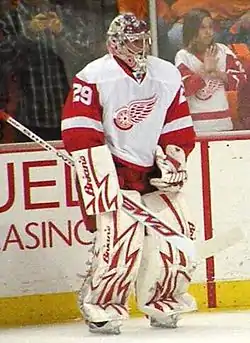
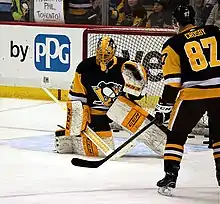
.jpg.webp)
